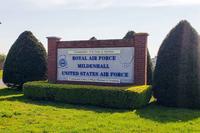The U.S. Army commander in Europe charged Thursday that Russia used Syria as a "live-fire training" exercise to boost President Vladimir Putin's claims that his military is now superior to that of the U.S.
Army Lt. Gen. Ben Hodges, the outspoken commander of U.S. Army Europe, made the charges as Putin met with his defense chiefs in Moscow and later boasted, "We can say with certainty we are stronger now than any potential aggressor -- anyone."
In a BBC interview, Hodges, who has been central to the buildup of U.S. and NATO forces in Europe against Russia, said that "what we see in Syria, of course is a demonstration of capabilities" by the Russian military with no regard for the civilian casualties and the suffering inflicted.
The Russians in their support of the regime of Syrian President Bashar al-Assad were "using weapons demonstrating, practicing if you will -- it's a live fire opportunity to experiment and train with all of its weapons systems. That's not helpful."
"Of course, the disregard for civilian casualties that we see in places like Aleppo, again, that‘s not the conduct of a nation that wants to be a superpower and be treated like a superpower," Hodges said, but Putin only underlined his claim that Russia was now dominant in both conventional and nuclear forces.
Hodges also suggested strongly that Russia was behind the continuing efforts to penetrate his command's cyber defenses. "Our systems are under attack from cyber, all sorts of different sources," he said. When asked if Russia was the source, Hodges said again "all sorts of different sources.
In a year-end report on the state of Russia's military, Putin said that the proven effectiveness of Russian weapons in Syria would boost their sales to other nations.
"The Syrian army received considerable support, thanks to which it carried out several successful operations against militants," he said, and "the effective use of Russian weapons in Syria opens new possibilities for military-technical cooperation. We must take maximum advantage of this. We know there is interest in modern Russian weapons from foreign partners."
Separately, Russian Defense Minister Sergei Shoigu said the military had used "162 types of modern armaments during the military campaign in Syria," including its Sukhoi warplanes and MiG and Kamov helicopters. "They have shown to be highly effective," he said.
He said that Russian airpower in Syria had "liquidated 725 training camps, 405 weapon factories and workshops, 1,500 pieces of terrorist equipment, and 35,000 fighters, including 204 field commanders," he said. In the process, Russia had "prevented the breakup of Syria" and shored up the Assad regime, Shoigu said.
Putin's remarks and another round of tweets from President-elect Donald Trump also suggested the possibility of another nuclear arms race between the U.S. and Russia.
"We need to strengthen the military potential of strategic nuclear forces, especially with missile complexes that can reliably penetrate any existing and prospective missile defense systems," Putin said.
"We must carefully monitor any changes in the balance of power and in the political-military situation in the world, especially along Russian borders, and quickly adapt plans for neutralizing threats to our country," Putin said in what appeared to be a reference to the placement of U.S. missile defense systems in Europe.
From his Mar-a-Lago Florida estate, Trump tweeted that "The United States must greatly strengthen and expand its nuclear capability until such time as the world comes to its senses regarding nukes."
Trump did not elaborate but his statement came a day after he met with a team of high-ranking military officials, including Vice Adm. James Syring, head of the Missile Defense Agency, and Lt. Gen. Jack Weinstein, deputy Air Force chief of staff for strategic deterrence and nuclear Integration.
The Pentagon has already planned for a major overhaul of the nation's nuclear triad, including the new B-21 Raider long-range bomber, new ballistic missile submarines and replacements for the aging Minuteman II Intercontinental Ballistic Missiles.
At the State Department, spokesman John Kirby said he could not comment on Trump call to expand the U.S. nuclear arsenal – "that's for him and his team" – but added that the Obama administration had stressed "reducing our stockpile and launchers" through the New Start treaty. However, "nobody's walking away from the fact that we need a credible deterrent" through "appropriate modernization," he said.
Kirby also said that the State Department would not dispute Syria's claim that Aleppo was now completely in the control of Assad's forces. "They're also responsible for the devastation and the havoc," he said. "They bear responsibility for what they did."
The carnage in Aleppo and the plight of the refugees was "caused almost solely by the regime and their backers in Moscow and Tehran. It wasn't the opposition who bombed hospitals and schools and first responders as they rushed to the scene. What happened in Aleppo is not going to bring this war to an end. It's going to go on."
-- Richard Sisk can be reached at richard.sisk@military.com























